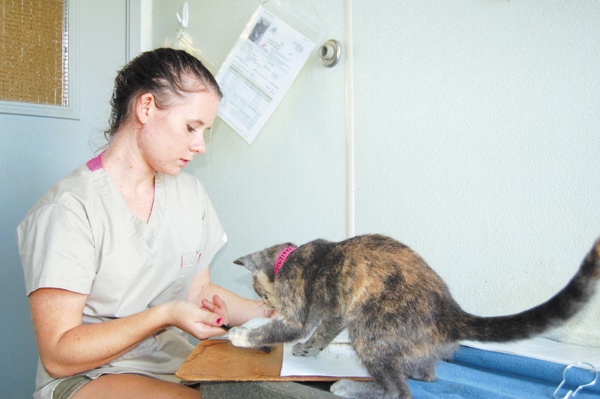LIHUE — Anne Punohu said she couldn’t help but giggle a little when she heard that the Kauai County Council would be considering a bill requiring cats to be licensed. “I thought, what’s next? Centipedes? Chickens,” the Kapaa resident
LIHUE — Anne Punohu said she couldn’t help but giggle a little when she heard that the Kauai County Council would be considering a bill requiring cats to be licensed.
“I thought, what’s next? Centipedes? Chickens,” the Kapaa resident said. “Chickens wouldn’t even know there are ordinances against them.”
Although the humane society should be reimbursed for cat ownership expenses, a law, she said, is not the answer.
Having one in place, she explained, may cause more conflicts between neighbors and a rise in the number of domestic cats abandoned islandwide.
“I understand the concerns about the feral cat populations and the importance of making sure that cats are not attacking our endangered birds, however … I must tell you that you’re putting the cart before the horse,” Punohu told the council during a recent public meeting.
Punohu is not alone.
Some residents say the cat licensing law, which includes specific neutering or spaying requirements, will help curb the island’s feral cat population and allow cat owners to have some of the same responsibilities as county dog owners.
But others, like Punohu, say the bill and proposed law should wait until the county’s Feral Cat Task Force, convened last year to address the island’s feral cat population, reports its findings and provides recommendations.
The nine-member task force is scheduled to meet on Feb. 10, following a nearly four-month respite.
Wednesday, the County Council’s Finance and Economic Development Committee voted 3-2 to approve Bill 2517 and send it back to the full seven-member body for final approval.
Councilmen Gary Hooser and Ross Kagawa voted against the bill.
“It seems like a lot of work for very little money and a very small segment of the population will be responsible for a very large part of the population,” Hooser said before casting his vote. “There also seems to be a lot of confusion between house cats, outdoor cats and cats that are being taken care of but don’t have a social relationship.”
Annual license fees, according to a draft version of the bill, would be $10 for spayed or neutered cats and $30 for unneutered or unspayed cats. Residents could also opt to purchase biennial licenses at a reduced cost.
Although the proposed law would require pet owners to spay or neuter cats that roam outside, KHS Executive Director Penny Cistaro said owners who keep their cats indoors would not be mandated to spay or neuter their animals.
Over the past six months, Cistaro said 726 dogs and 1,256 cats were turned into the humane society — only 6 percent of the cats, compared to 44 percent of the dogs, were redeemed by their owners.
What’s troubling, she said, is that the humane society is already on track to receive about 2,500 stray cats by the end of the year.
The organization’s budget presented to the County Council last year designated about $340,000 to handle cats, Cistaro said. The humane society’s costs to address feral cats, she said, is about $160,000.
In the first year, the cat licensing fee is estimated to generate about $23,000 in revenue for the humane society, Cistaro said.
The County Council will consider this measure Wednesday beginning at 8:30 a.m.


